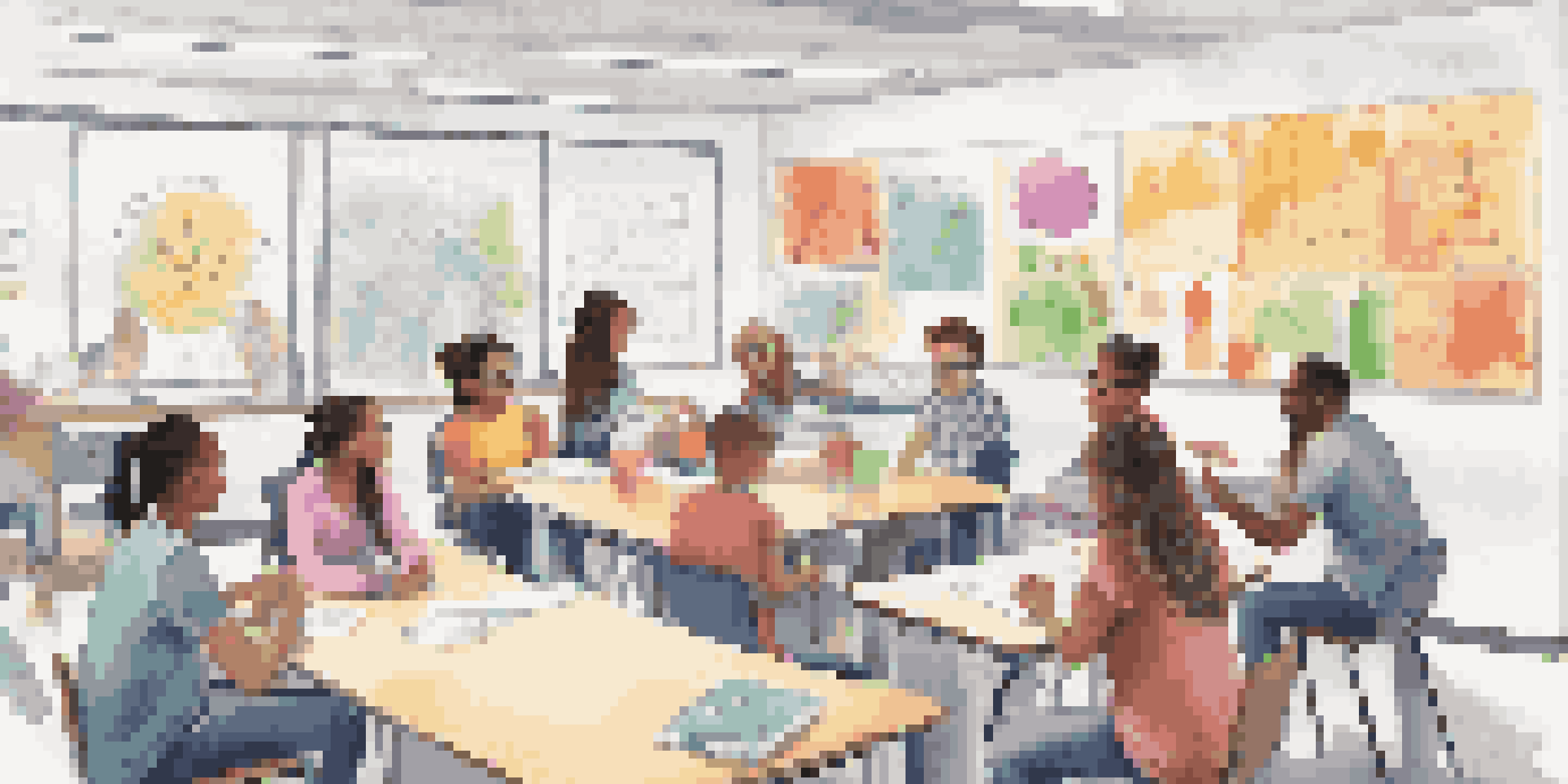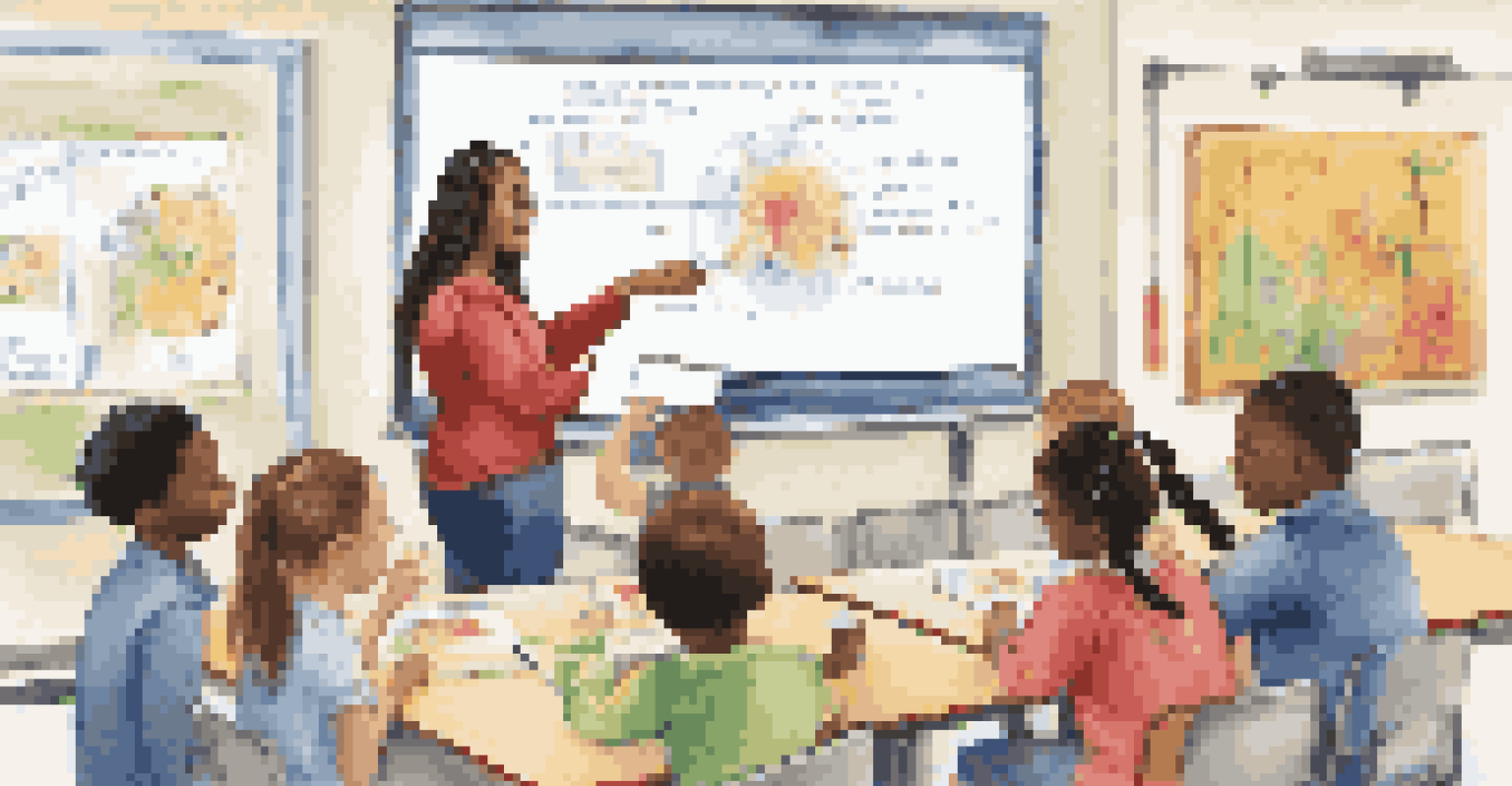Student-Centered Learning: Preparing Students for the Future

Understanding Student-Centered Learning
Student-centered learning shifts the focus from teachers to students, placing learners at the heart of the educational process. This approach encourages students to take charge of their own learning through exploration and inquiry. By prioritizing individual needs and interests, educators create a more engaging and personalized learning environment.
The greatest danger in times of turbulence is not the turbulence; it is to act with yesterday's logic.
In contrast to traditional methods, where teachers deliver information in a one-size-fits-all manner, student-centered learning promotes active participation. Students are more likely to retain information when they are involved in discussions, projects, and hands-on activities. This approach not only enhances understanding but also fosters critical thinking skills.
Ultimately, understanding the principles of student-centered learning is essential for educators. By recognizing how students learn best, teachers can adapt their methods to support diverse learning styles. This foundational knowledge sets the stage for developing effective teaching strategies that prepare students for future challenges.
The Role of Collaboration in Learning
Collaboration is a key component of student-centered learning, as it encourages students to work together to solve problems and share ideas. When students collaborate, they learn to communicate effectively, negotiate differing viewpoints, and develop a sense of community. These skills are essential for success in both academic and professional settings.

For example, group projects allow students to leverage each other's strengths, fostering a deeper understanding of the subject matter. The result is a more enriching learning experience that goes beyond individual comprehension. Collaboration not only enhances learning outcomes but also prepares students for teamwork in the workplace.
Emphasizing Student Engagement
Student-centered learning prioritizes engagement by encouraging students to take control of their own educational journey through exploration and collaboration.
Moreover, fostering a collaborative environment helps students feel more connected to their peers. This sense of belonging can boost motivation and engagement, making learning more enjoyable. Ultimately, collaboration transforms the classroom into a vibrant space where ideas flourish and students thrive.
Encouraging Critical Thinking Skills
One of the primary goals of student-centered learning is to cultivate critical thinking skills. This involves encouraging students to analyze information, question assumptions, and make informed decisions. By engaging in discussions and debates, students learn to think critically about various topics and develop their own perspectives.
Tell me and I forget, teach me and I remember, involve me and I learn.
For instance, case studies and real-world scenarios can challenge students to apply their knowledge to practical situations. This not only enhances understanding but also prepares them to tackle complex problems outside the classroom. Encouraging critical thinking helps students become more independent thinkers and lifelong learners.
Additionally, when students feel empowered to express their thoughts and ideas, they become more engaged in the learning process. This heightened engagement leads to deeper insights and a greater willingness to explore challenging concepts. Ultimately, critical thinking is essential for navigating the complexities of the modern world.
Personalized Learning Experiences
Personalized learning is at the core of student-centered approaches, allowing students to learn at their own pace and according to their unique interests. This tailored approach acknowledges that each learner is different, with varying strengths, weaknesses, and preferences. By adapting lessons to meet individual needs, educators can maximize student engagement and success.
For example, technology can play a significant role in personalizing education. Online platforms and learning management systems can provide customized resources and assessments that suit each student's learning style. This flexibility enables students to take ownership of their education, fostering a sense of responsibility and motivation.
Collaboration Enhances Learning
Working together in collaborative environments not only boosts students' understanding of subjects but also builds essential communication and teamwork skills.
Moreover, personalized learning experiences help students develop self-awareness regarding their learning processes. By reflecting on their progress and challenges, students can set achievable goals and take proactive steps to reach them. In this way, personalized learning equips students with the tools they need to thrive in their future endeavors.
The Impact of Technology on Learning
Technology has revolutionized education, making student-centered learning more accessible and effective. With the rise of digital tools, educators can create interactive and engaging learning experiences that cater to diverse learning styles. From virtual simulations to collaborative online projects, technology enhances the learning environment in countless ways.
For instance, using educational apps and online resources can provide students with immediate feedback and support. This instant access to information empowers students to take charge of their learning journey, exploring topics that intrigue them. As a result, technology not only facilitates learning but also sparks curiosity and innovation.
Additionally, the integration of technology prepares students for a tech-driven future. In a world where digital literacy is essential, students must become adept at navigating various platforms and tools. By incorporating technology into the learning process, educators equip students with the skills they need to succeed in an increasingly digital landscape.
Fostering a Growth Mindset
A growth mindset is crucial for student-centered learning, as it encourages students to embrace challenges and view failures as opportunities for growth. This mindset fosters resilience and determination, essential qualities for navigating the ups and downs of academic and professional life. By promoting a growth mindset, educators can help students develop a more positive attitude toward learning.
For example, when students are encouraged to take risks and learn from their mistakes, they become more willing to engage in challenging tasks. This willingness to step outside their comfort zones leads to increased confidence and mastery of new skills. Ultimately, fostering a growth mindset helps students recognize that effort and persistence can lead to success.
Preparing for Future Challenges
By fostering critical thinking, adaptability, and a growth mindset, student-centered learning equips students with vital skills necessary for navigating the complexities of the modern world.
Moreover, a growth mindset creates a supportive learning environment where students feel empowered to share their thoughts and experiences. This openness enhances collaboration and encourages peer support, further enriching the learning experience. By instilling a growth mindset, educators lay the groundwork for students to become adaptable and innovative thinkers.
Preparing Students for Future Challenges
Student-centered learning equips students with the skills they need to tackle future challenges confidently. By fostering critical thinking, collaboration, and adaptability, educators prepare students for an ever-changing world. In this dynamic landscape, the ability to learn independently and work effectively with others is more important than ever.
As students engage in personalized learning experiences, they develop a sense of agency and responsibility for their education. This empowerment encourages lifelong learning, as students become motivated to seek out new knowledge and skills throughout their lives. In an age of rapid technological advancement, this adaptability is crucial for success.

Ultimately, preparing students for future challenges goes beyond academic knowledge. It encompasses social, emotional, and practical skills that will serve them well in their careers and personal lives. By embracing student-centered learning, educators are not just teaching subjects; they are cultivating the innovators and leaders of tomorrow.